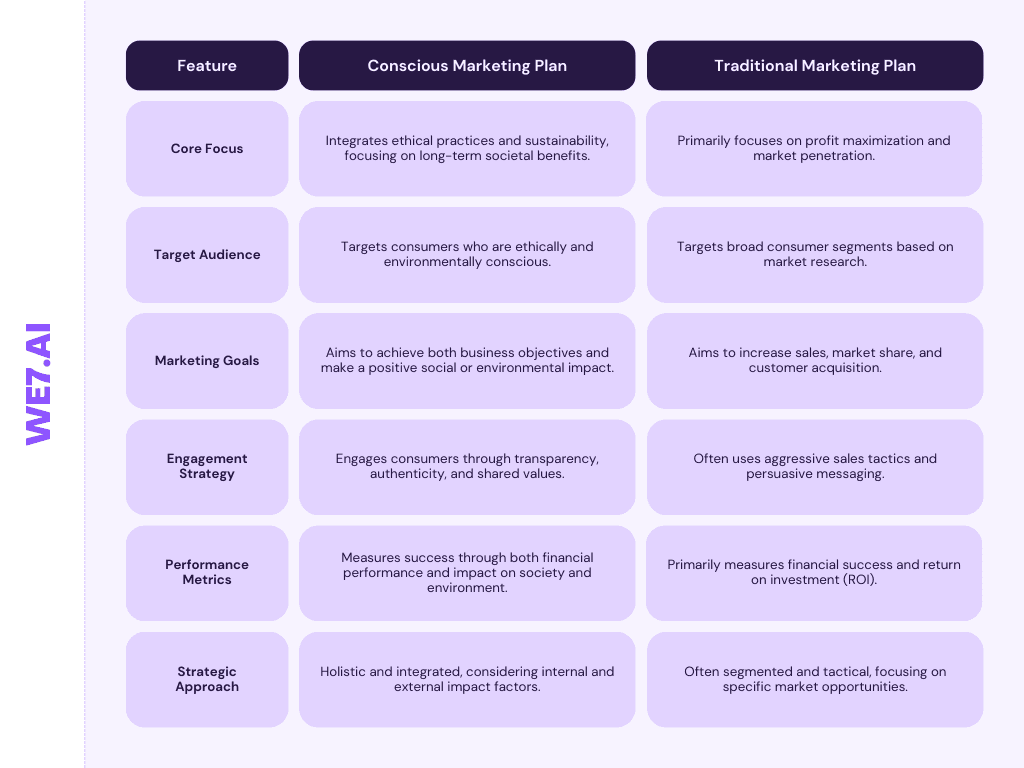2
Conscious Marketing vs. Traditional Marketing: Charting a New Path
WE7
In the fast-evolving landscape of modern business, marketing strategies play a pivotal role in shaping a company's success and its public image. As societal awareness increases, so does the demand for businesses to adopt ethical practices and sustainability. This shift has given rise to conscious marketing—a strategy that not only seeks to promote a product or service but also aims to positively impact society and the environment. This article delves into the differences between conscious marketing and traditional marketing approaches, illustrating why the former is becoming essential for businesses aiming to thrive in today's market.
Core Focus and Goals
Traditional marketing strategies have primarily focused on profit maximization, customer acquisition, and market penetration. The core aim has been to boost sales and increase company revenue, often at the expense of long-term societal benefits. In contrast, conscious marketing integrates ethical practices into the marketing strategy, focusing on long-term societal welfare and environmental sustainability. This approach doesn't just aim to sell but to connect, making businesses a part of their consumers' lives and their ethical choices.
Target Audience and Engagement
Conscious marketing specifically targets consumers who are ethically aware and environmentally conscious. These consumers look for brands that align with their values, making them more likely to develop a deep, loyal relationship with such brands. On the other hand, traditional marketing casts a wider net, aiming to attract as broad an audience as possible without focusing on shared ethical values. The engagement strategies employed in conscious marketing emphasize transparency, authenticity, and shared values, whereas traditional marketing often relies on aggressive sales tactics and persuasive advertising.
Strategies and Tools
The tools and techniques employed in conscious marketing often include advanced AI technologies that align strategies with ethical standards and accurately measure social impact alongside business success. Traditional marketing strategies, in contrast, utilize standard analytics tools focused on optimizing consumer behavior and increasing immediate sales. The conscious marketing approach not only serves to enhance brand perception but also ensures that every marketing effort contributes to a broader, socially responsible agenda.

Performance Metrics and Adaptability
Performance in conscious marketing is measured by a dual set of metrics: financial performance and impact on society and the environment. This balanced scorecard approach encourages companies to consider the broader implications of their marketing strategies. Traditional marketing, however, remains primarily focused on financial metrics such as ROI and market share. Furthermore, conscious marketing is highly adaptive to global socio-economic shifts, ethical concerns, and community needs, making businesses not only more resilient but also more relevant in today’s world.
Brand Perception and Market Position
Adopting conscious marketing can significantly enhance a company's reputation, positioning it as a responsible and forward-thinking entity. This is increasingly important in a marketplace where consumers are becoming more judicious about where they spend their money. Companies that engage in conscious marketing are often seen as more trustworthy and reliable than those following traditional paths. The long-term benefits of such a marketing strategy include sustained customer loyalty, enhanced brand value, and a stronger, more meaningful market presence.

Conclusion and Recommendations
The growing preference for conscious marketing reflects a broader change in global consumer attitudes and a shift towards more sustainable and ethical business practices. Companies are encouraged to reevaluate their current marketing strategies and consider the long-term benefits of integrating conscious marketing practices. By doing so, businesses will not only enhance their competitiveness but also contribute positively to the world they operate in. Let the success of brands that have embraced this approach inspire others to take the step towards ethical marketing, proving that doing good is not just good for the world—it’s good for business too.

